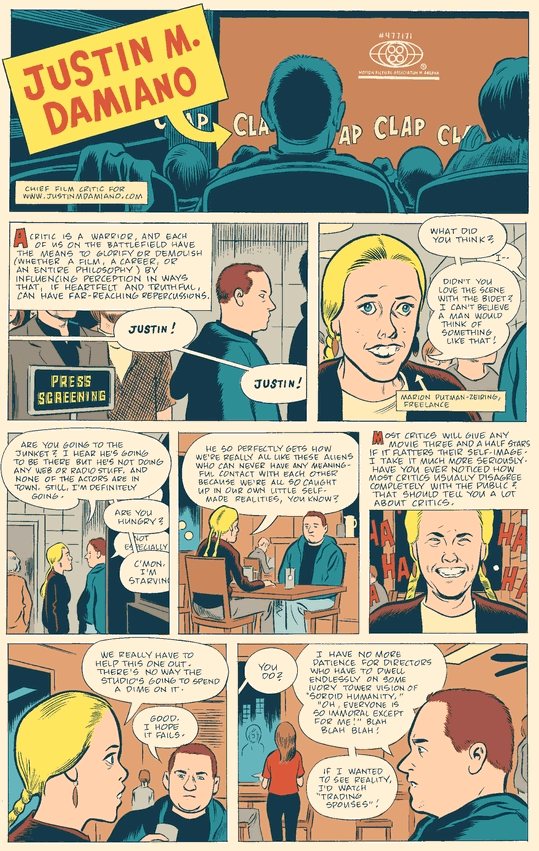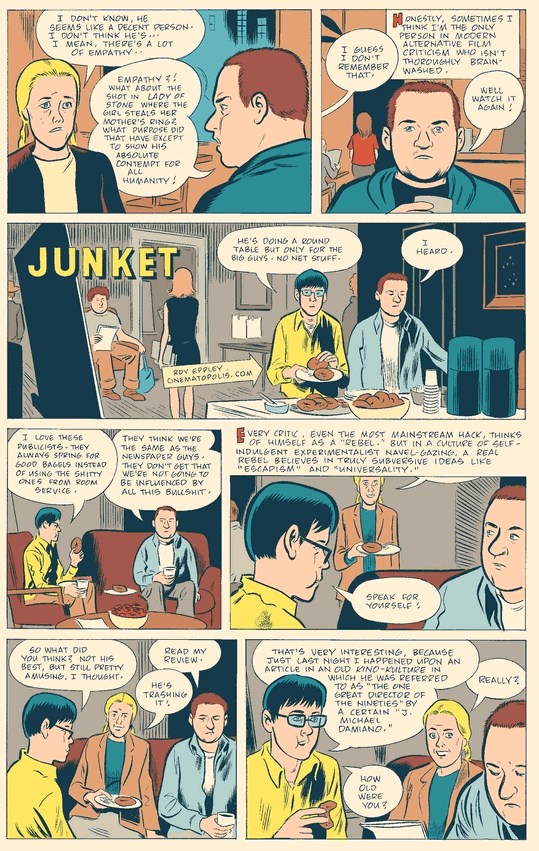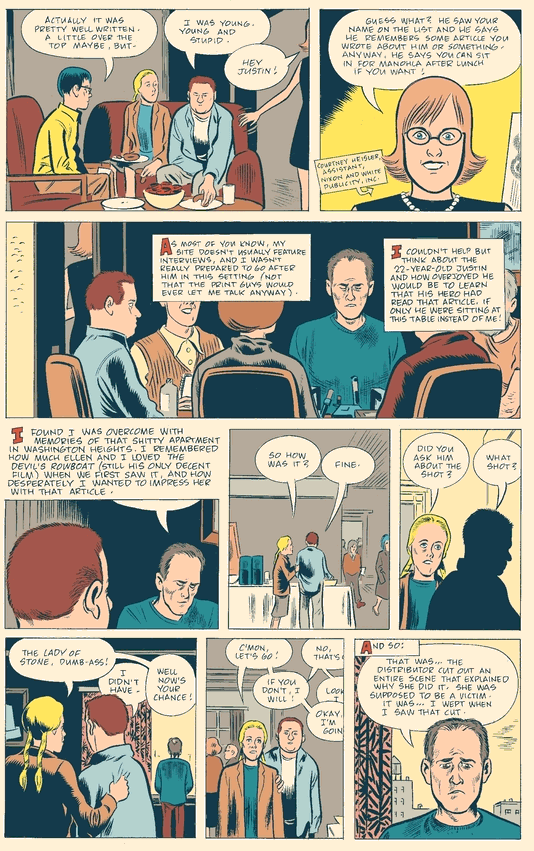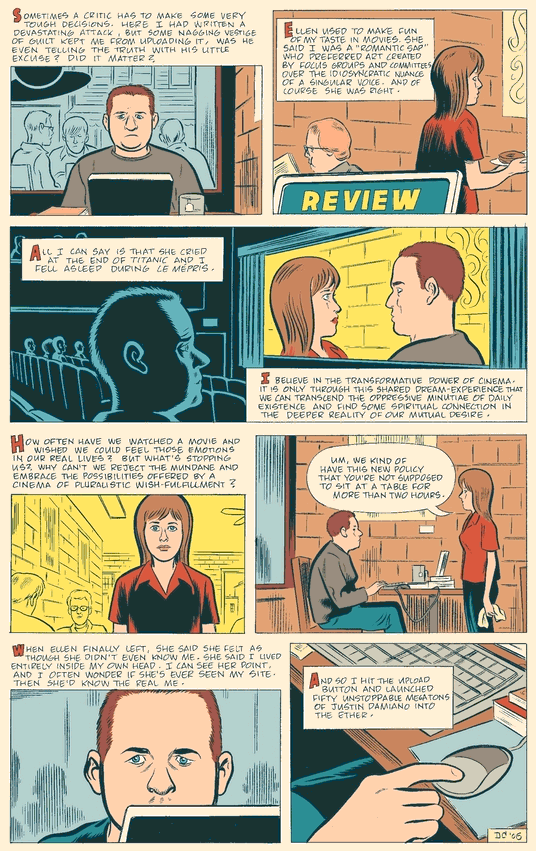The Book of Other People (4 page)
Read The Book of Other People Online
Authors: Zadie Smith
‘Go ahead.’ Judith Castle-Dunbar’s voice is armoured in self-belief, and brings to mind the huskiness of Margaret Thatcher. I like it. ‘You must have so much to sort out.’
‘This is too rude, and
you
are too kind.’
you
are too kind.’
‘Not at all.’ I toyed with my pearls, wondering if he’d guessed the identity of little old
moi
. ‘You’re holding up valiantly.’
moi
. ‘You’re holding up valiantly.’
Leo smiled his roguish smile and answered the phone in his masculine way. I perched on a bottom stair and did some pelvic-floor exercises. ‘Jimbo!’ Leo muffled his voice this time, speaking low and turning away. ‘Olly’s not here, no . . .’
An acquaintance had yet to hear the dreadful tidings, doubtless.
‘He’s not answering the phone for a day or two.’ Leo spoke low, but my hearing is excellent. ‘He met this woman on the Internet, right - yeah, I know, how dodgy is that? So they meet up, just the once, just a week ago, right, in Bath - and
in
sink those female talons . . . Nah, she said “mid-forties” but Olly reckons it’s more “mid-sixties” . . . It’s not that, though. After
just one meeting
, right, she books herself in at the Hotel Excalibur no less to - exact words, I josh not - to “consummate our relationship”! “
Consummate our relationship
”! Couldn’t make it up, could you? So Olly comes on his knees to me, right, to phone her up and tell her he’s dead. It’s not funny! No other way to get her off his back . . . Whassat? . . . I dunno . . . some tragic menopausal hag. Like she’s
desperate
to be loved, but she pounces on anyone who
might
love her, so desperately, so hungrily, they run a mile! What? . . . Oh, that’s the funniest part. I
meant
to say he’d had a heart attack - nice and clean, see, no complications - but when the crunch came, right, out came this garble about a hit-and-run driver . . . Stop laughing!
Then
, of course, Miss Hormone Replacement Therapy demands a starring role in the funeral, right, so
then
I have say he’s already been cremated, and I tipped his ashes off the Cobb myself . . . Look, Jimbo, got to run, a customer’s waiting. Olly’ll be down the Lord Nelson later. Get the gory details off him yourself. Yep. Bye.’
in
sink those female talons . . . Nah, she said “mid-forties” but Olly reckons it’s more “mid-sixties” . . . It’s not that, though. After
just one meeting
, right, she books herself in at the Hotel Excalibur no less to - exact words, I josh not - to “consummate our relationship”! “
Consummate our relationship
”! Couldn’t make it up, could you? So Olly comes on his knees to me, right, to phone her up and tell her he’s dead. It’s not funny! No other way to get her off his back . . . Whassat? . . . I dunno . . . some tragic menopausal hag. Like she’s
desperate
to be loved, but she pounces on anyone who
might
love her, so desperately, so hungrily, they run a mile! What? . . . Oh, that’s the funniest part. I
meant
to say he’d had a heart attack - nice and clean, see, no complications - but when the crunch came, right, out came this garble about a hit-and-run driver . . . Stop laughing!
Then
, of course, Miss Hormone Replacement Therapy demands a starring role in the funeral, right, so
then
I have say he’s already been cremated, and I tipped his ashes off the Cobb myself . . . Look, Jimbo, got to run, a customer’s waiting. Olly’ll be down the Lord Nelson later. Get the gory details off him yourself. Yep. Bye.’
An ice-cream van crawled by in the hissing rain.
Its chimes played that famous pop-ballad. About love, and Robin Hood.
What
’s that song called? Top of the charts, it was, one summer.
’s that song called? Top of the charts, it was, one summer.
One long hot summer, when Camilla was little.
Oh,
everyone
knows that song.
everyone
knows that song.
Justin M. Damiano
Daniel Clowes




Frank
A. L. Kennedy
The cinema was tiny: twelve rows deep from the blacked-out wall and the shadowed doorway down to the empty screen, which had started to stare at him, a kind of hanging absence. How did they make any money with a place this small? Even if it was packed?
Which it wasn’t. Quite the reverse. There was, in fact, no one else here. Boy at the door had to turn the lights on just for him, Frank feeling bad about this, thinking he shouldn’t insist on seeing a film all by himself and might as well go to the bigger space they kept upstairs which had a balcony and quite probably gilt mouldings and would be more in the way of a theatre and professional. In half an hour they’d be showing a comedy up there.
Or he could drive to a multiscreen effort: there’d been one in the last big town as he came round the coast - huge glass and metal tower, looked like a part of an airport - they’d have an audience, they’d have audiences to spare.
Although that was a guess and maybe the multiplex was empty, too. The bar, the stalls that sold reconstituted food, the toilets, the passageways, perhaps they were all deserted. Frank felt that he hoped so.
And he’d said nothing as he’d taken back his torn stub and walked through the doorway, hadn’t apologised or shown uncertainty. He’d only stepped inside what seemed a quite attentive dark as the younger man drifted away and left him to it.
Four seats across and then the aisle and then another four and that was it. The room wasn’t much broader than his lounge and it put Frank in mind of a bus, some kind of wide, slow vehicle, sliding off to nowhere.
He didn’t choose a seat immediately, wandering a little, liking the solitude, a whole cinema of his own - the kind of thing a child might imagine, might enjoy. He believed he would move around later if no one else appeared, run amok just a touch and leave his phone turned on so he could answer it if anybody called.
Then behind him there came a grumble of male conversation, a blurry complaint about the cold and then a burst of laughter and the noise of feet - heavy steps approaching and a softer type of scuffling that faded to silence. Frank was willing to be certain that Softer-foot was the kid from the door: lax posture and dirty Converse All Stars with uneven wear - product of a careless home, a lax environment - probably he’d padded in close again and then headed back out to the foyer - that’s how it sounded, but you never could tell.
At least one person was still there, still loitering, and for a moment this was almost unnerving. Frank being alone in a cinema, that was all right - alone in a muddle of people in a cinema, that was all right - just yourself and one other, two others, strangers at your back as the lights dim and the soundtrack starts to drown out everything - that might not be good. Silly to think that way, but he did.
For a moment.
Then he focused on being irritated, his nice privacy broken when it had extended so very far by now, right up to the black walls that melted when you studied them, disappeared down into the black carpet and left you adrift with nothing but the dull red shine of plush seats and a sense of your skin, your movement, fidgets of life.
It was fine, though. Nobody joined him. The heavy steps withdrew, closed themselves up, Frank guessed, inside the projectionist’s box, along with another, more ruminative laugh. After that a regular, clattering slap started up and he supposed this to be the sound of loose film at the end of a reel, but he couldn’t imagine why it was simply rattling round again and again.
He waited, the clatter persisting, his feet and fingers beginning to chill. One punter, apparently, didn’t merit heating. Even if he did still need it. Simply needing didn’t mean you’d get. Little vents near the ceiling breathed and whispered occasionally, but that would be the wind outside disturbing them. The night was already roaring out there and set to turn worse, rain loping over the pavements, driven thick, and a bitterness underlying it that ached your teeth, your thinking. Warmth had drained from his shins where his trousers were soaked and the coat he was huddled into was only a fraction less damp.
Frank put on his hat.
The rattle of unattached film continued. And he believed he’d heard a chuckle, then a cough. Frank concentrated on his head, which felt marginally warmer, because of the hat. Good hat: flat cap, proper tweed and not inexpensive. A man should have a hat, in his opinion. Beyond a certain age it will suit him and give him weight, become a welcome addition to his face, almost a trademark. People will look at his hat as it hangs on the back of a chair, or a coat hook, or rests on the edge of his desk, and they will involuntarily assume -
Frank’s here, then. That’s his hat. Frank’s old, familiar hat
. Through time, there will be a small transfer of emotion and people who are fond of him will also like his hat, will see something in it: a sense of his atmosphere, his style - and they’ll be pleased.
Frank’s here, then. That’s his hat. Frank’s old, familiar hat
. Through time, there will be a small transfer of emotion and people who are fond of him will also like his hat, will see something in it: a sense of his atmosphere, his style - and they’ll be pleased.
His own transfers were largely negative. For example, he truly detested his travelling bag. This evening it would be waiting inside his hotel room, crouching by his bed like the guard dog in an unfamiliar house. It always was by his bed, no matter where he was sleeping, neatly packed for when he’d have to leave, fill it with his time and carry it the way he’d enjoy being carried, being lifted over every obstacle.
Never thought he would use it on his own account - the bag. Never thought he’d steal his days from everyone and run away.
Not his fault. He didn’t want this. She forced his hand.
He’d been in the kitchen, preparing soup. Each Friday he’d make them both a big vegetable soup: beans, leaves, potatoes, celery, lentils, tomatoes, bits of pasta, seasonal additions, the best of whatever he found available. Every week it would be slightly different - less cabbage, some butternut squash, more tamarind paste - but the soup itself would be a steady feature. If he was at home that evening he would cook. It would be for her. It would be what he quietly thought of as an offering -
here I am and this is from me and a proof of me and a sign of reliable love
. She would open some wine, maybe, and watch him slice: the way he rocked the knife, setting a comfy rhythm, and then the onions and garlic would go on the heat to soften and the whole house would start to smell domestic and comforting and he would smile at her, tuck his ingredients into the pan, all stripped and diced, and add good stock.
here I am and this is from me and a proof of me and a sign of reliable love
. She would open some wine, maybe, and watch him slice: the way he rocked the knife, setting a comfy rhythm, and then the onions and garlic would go on the heat to soften and the whole house would start to smell domestic and comforting and he would smile at her, tuck his ingredients into the pan, all stripped and diced, and add good stock.
He’d been in the kitchen, slicing, no one to watch. French knives, he had, sharp ones, well balanced, strong, a pleasure to work with, and she’d been late home so he’d started off without her. The blade had slipped. With squash you’ve got to be careful because it’s always tough and can deflect you, slide you into an accident. But he hadn’t been paying attention and so he’d got what he deserved.
He’d been in the kitchen alone. Funny how he didn’t feel the pain until he saw the wound. Proximal phalanx, left ring finger, a gash that almost woke the bone. Blood.
He’d been in the kitchen and raised his hand, had made observations, considered his blood. It ran quickly to his wrist, gathered and then fell to the quarry tiles below, left large, symmetrically rounded drops indicative of low velocity and a perpendicular descent, and haloing every drop was a tiny flare of threads, of starring. The tiles were fairly smooth, but still confused his fluid into throwing out fine liquid spines. Glass would be better, holding his finger close over glass might give him perfect little circles: the blood, as it must, forming spheres when it left him and the width of each drop on impact being equal to each sphere’s diameter. You could count on that.
Other books
Ryan's Treasure by Becca Dale
Confused #1 (Confused Romance Series - book#1) by Oliver Cooper
Unknown by Unknown
Deadly Web by Barbara Nadel
Key to Love by Judy Ann Davis
The Bards of Bone Plain by Patricia A. McKillip
Rise to Greatness by David Von Drehle
Operation Gadgetman! by Malorie Blackman
Double Feature by Erika Almond
Take a Chance on Me by Marilyn Brant